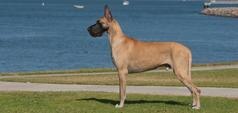
Osteosarcoma Research in German Shepherds: Vaccine Therapy & Immune Responses

After receiving a diagnosis from her veterinarian based on radiographs, Julia Priest from Galt, California, suspected that her 10-year-old German Shepherd Dog, "Jessy," had suffered a torn cranial cruciate ligament in her left stifle joint. Herret’s Fire Jessy von Sontausen CDX TD BH PT JHD, a highly accomplished performance dog with titles in obedience, tracking, and herding, was now experiencing pain and had become inactive, avoiding putting weight on the injured leg. Seeking further guidance, Priest consulted a specialist who conducted radiographs revealing the presence of osteosarcoma.
“Sadly, the cancer was advanced, and nothing could be done for Jessy,” Priest says. “The timeframe from the original diagnosis to euthanasia was approximately six months, though the cancer progressed rapidly over the last eight weeks of her life. Jessy lived to be 11 years and 34 days of age.”
Osteosarcoma, a formidable and difficult malignancy, is a type of bone cancer that poses significant challenges. The exact cause of osteosarcoma remains unknown, but larger and giant dog breeds are considered to be at higher risk due to their size and weight. The standard treatment for this aggressive and prevalent primary bone cancer in dogs typically involves surgical amputation of the affected leg, followed by chemotherapy to help impede the progression of metastasis.
The gravity of canine osteosarcoma and its devastating effect on dogs and their families has prompted the American German Shepherd Dog Charitable Foundation Inc. (AGSDCF) to support research at the University of Florida investigating a vaccine therapy and to fully fund an AKC Canine Health Foundation Clinician-Scientist Fellowship allowing a medical oncology resident at the University of Minnesota to investigate the unique DNA methylation patterns that characterize the immune cells present in osteosarcoma tumours.
GD3-Based Vaccine
The University of Florida conducted a two-year study with the aim of developing a vaccine that could extend the lives of dogs with osteosarcoma. This vaccine would be used as an adjuvant immunotherapy alongside standard treatment. Rowan J. Milner, BVSc, MMedVet, PhD, DACVIM (Oncology), DECVIM (Oncology), a professor and director of Clinical and Translational Research, led the investigation. The clinical trial focused on evaluating the efficacy of a nanoscale liposomal disialyl-ganglioside (GD3)-based vaccine.
GD3, a molecule found on the surfaces of normal neural cells and melanocytes, is also abundantly expressed on osteosarcoma and melanoma cells. It is believed that GD3 plays a role in promoting malignancy in these cancers, making it a potential target for immunotherapy.
“This is a unique study as most immunotherapies are given after chemotherapy is complete. We wanted to capture those dogs that typically get metastases during chemotherapy,” Dr. Milner says. “Approximately 30 percent of the vaccinated dogs lived significantly longer than the dogs receiving the standard of care treatment only.”
Characterizing Immune Cells
Caroline Wood, DVM, PhD, a medical oncology resident at the University of Minnesota, is conducting research on the immune system's role in osteosarcoma. Her work, supported by the AKC Canine Health Foundation Clinician-Scientist Fellowship funded by AGSDCF, involves studying the DNA methylation patterns of lymphocytes, which are crucial immune cells in the body.
“DNA methylation is a biological process by which a molecule acts as a chemical tag on DNA, which can alter the expression of the gene without changing its sequence,” Dr. Wood explains. “This leads to either increased or decreased transcription, and usually changed activity of the gene. The goal of this study is to further characterize the specific types of memory T-lymphocytes that help the immune system kill cancer cells present in osteosarcoma.”
Purina® Pro Plan® is the #1 brand most fed and recommended brand by dog breeders in Canada.* Learn more about the what the Pro Club Breeder program has to offer, including up to 25% savings on Pro Plan dog and puppy food, a free bag of puppy food for your new pet owners and more!
*Canadian Dog Fancier survey results, November 2023
Related articles


